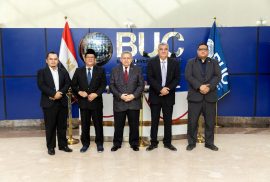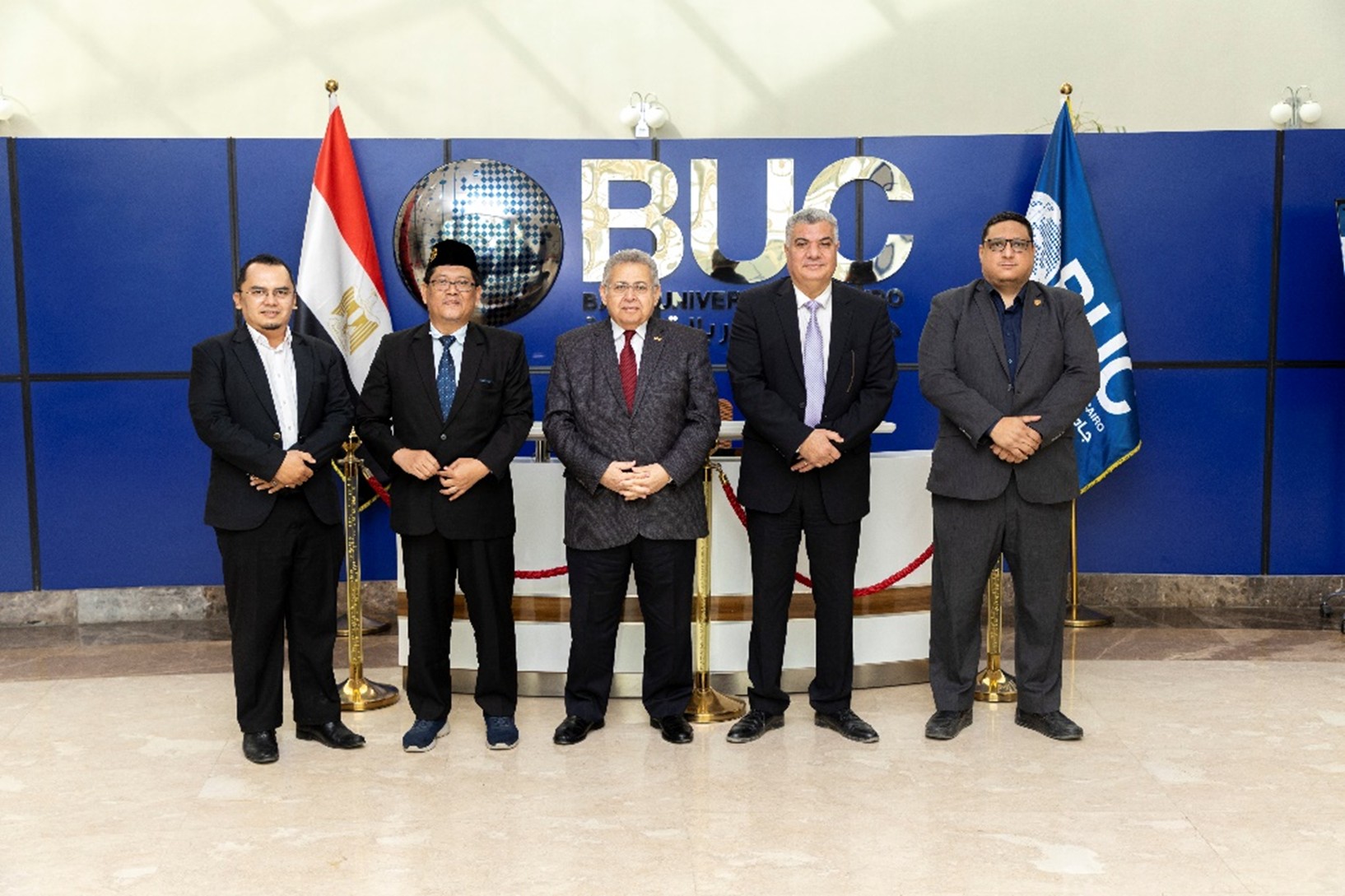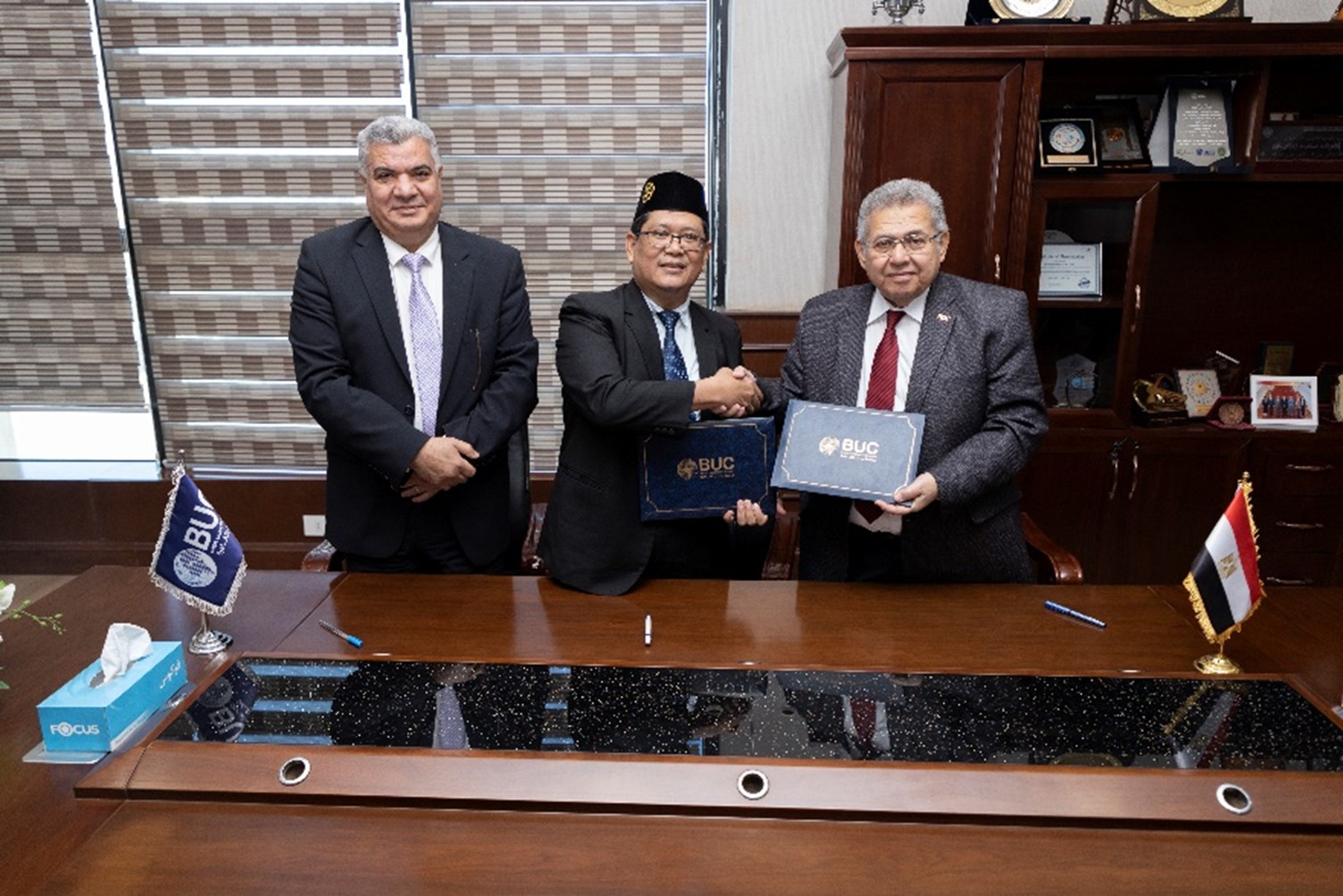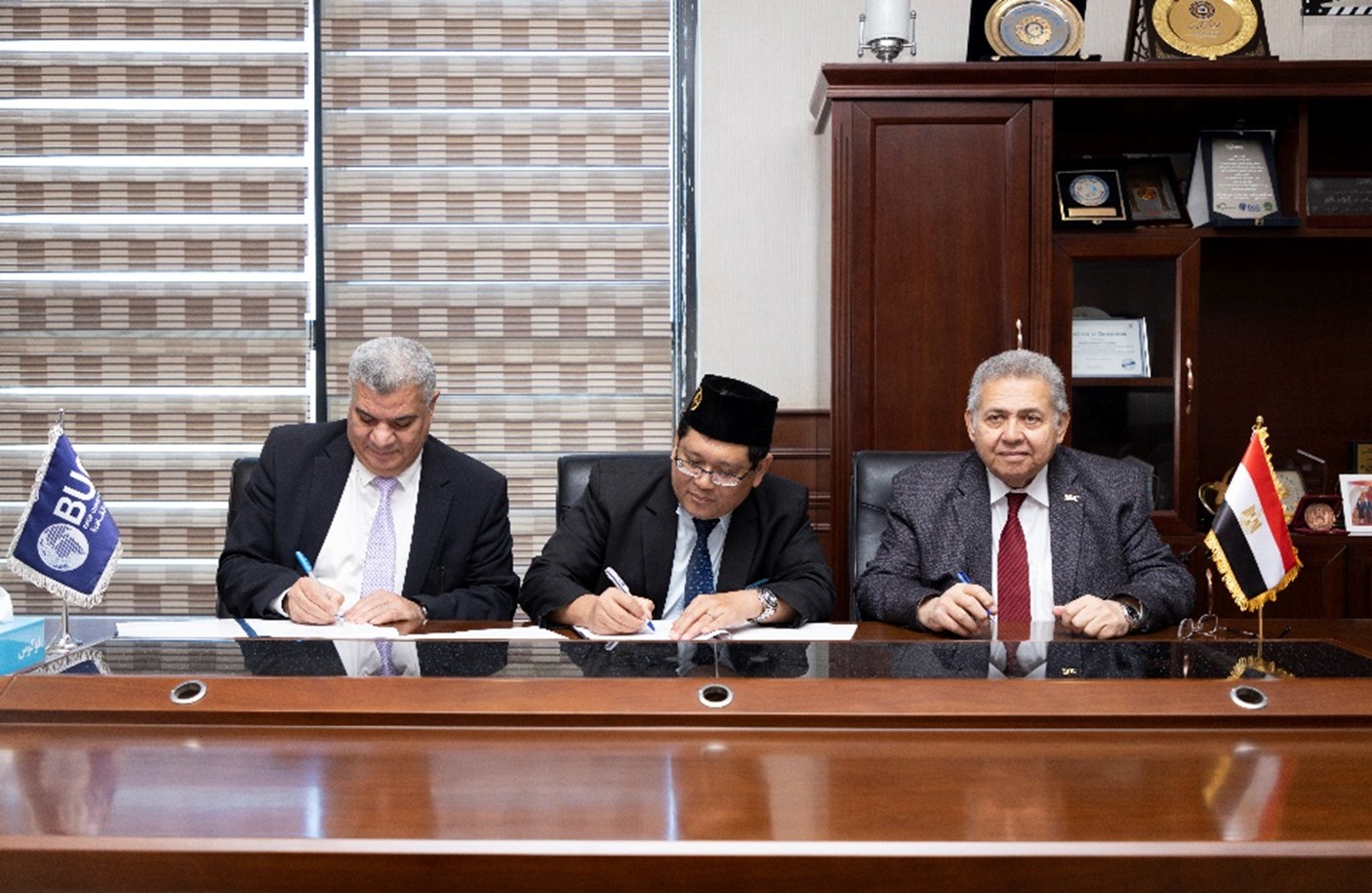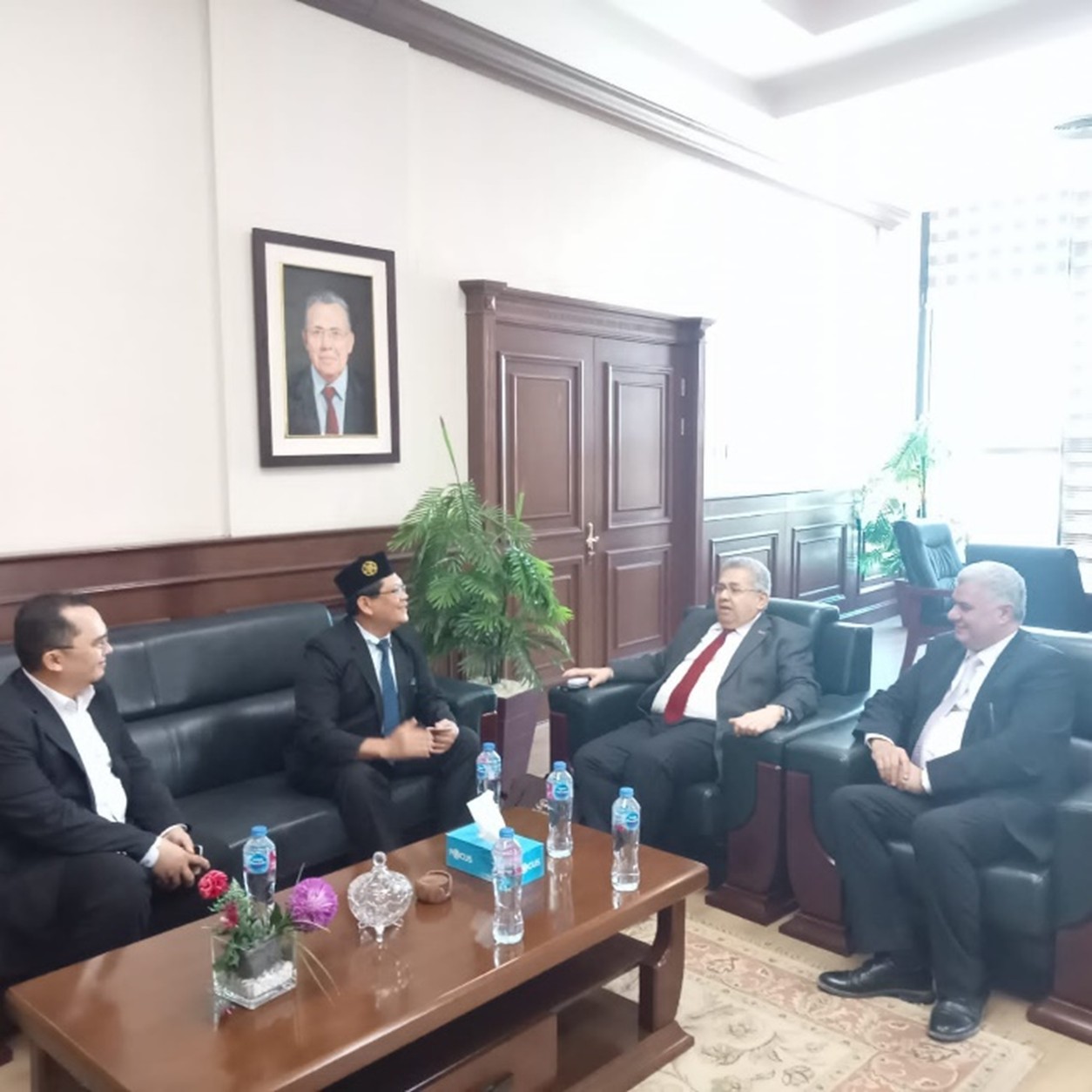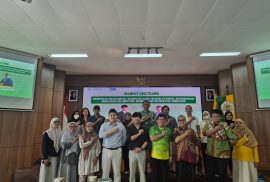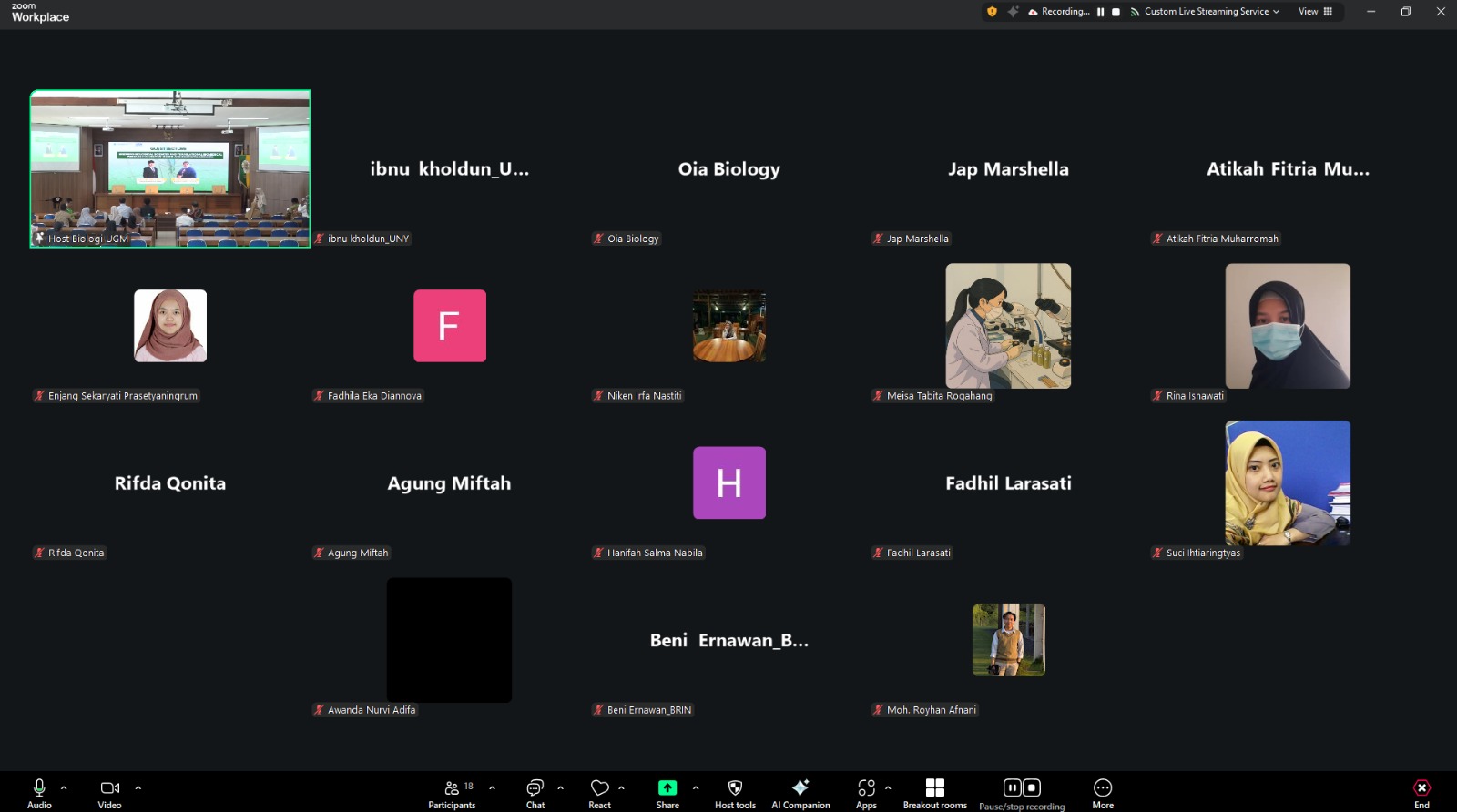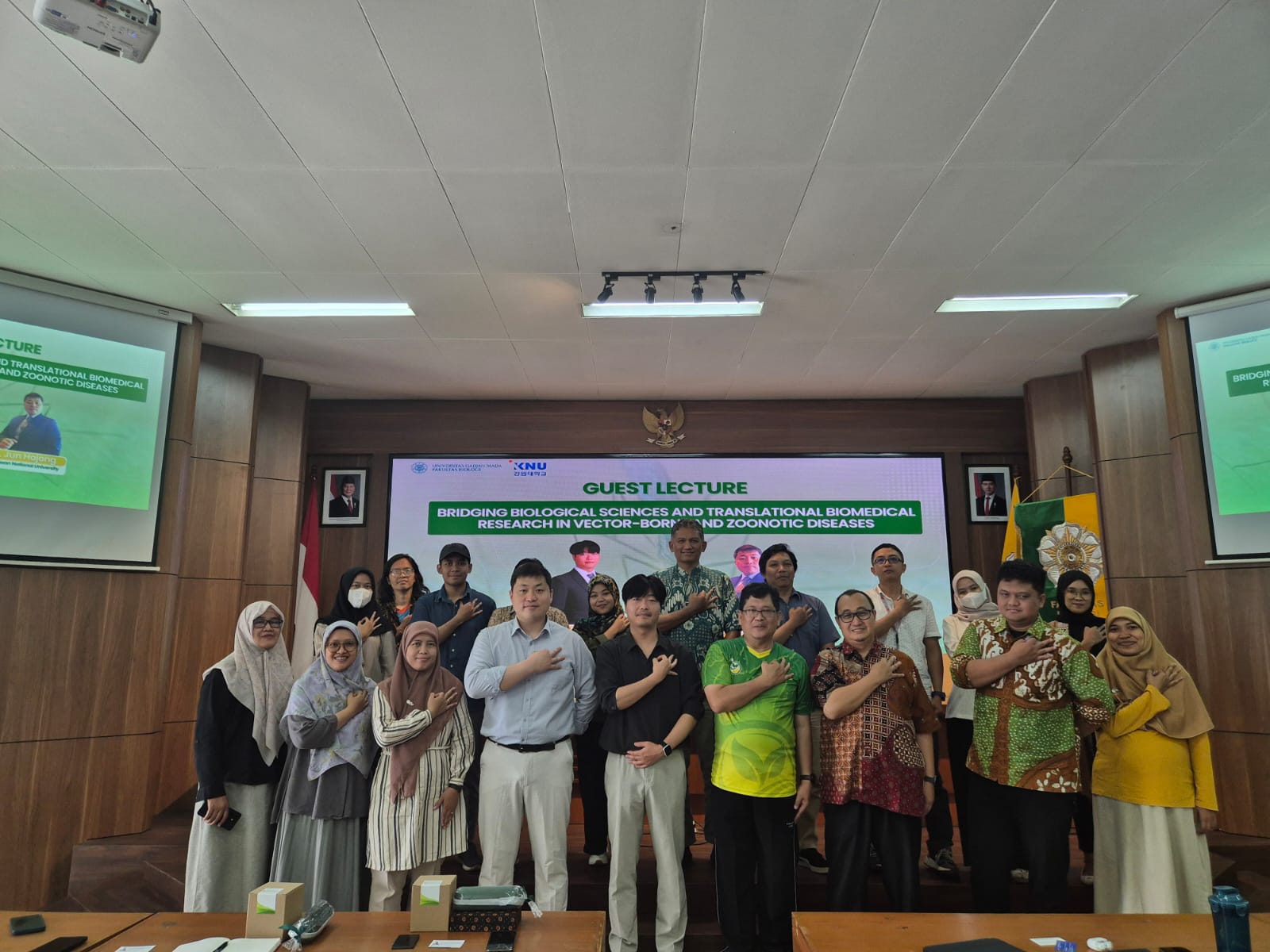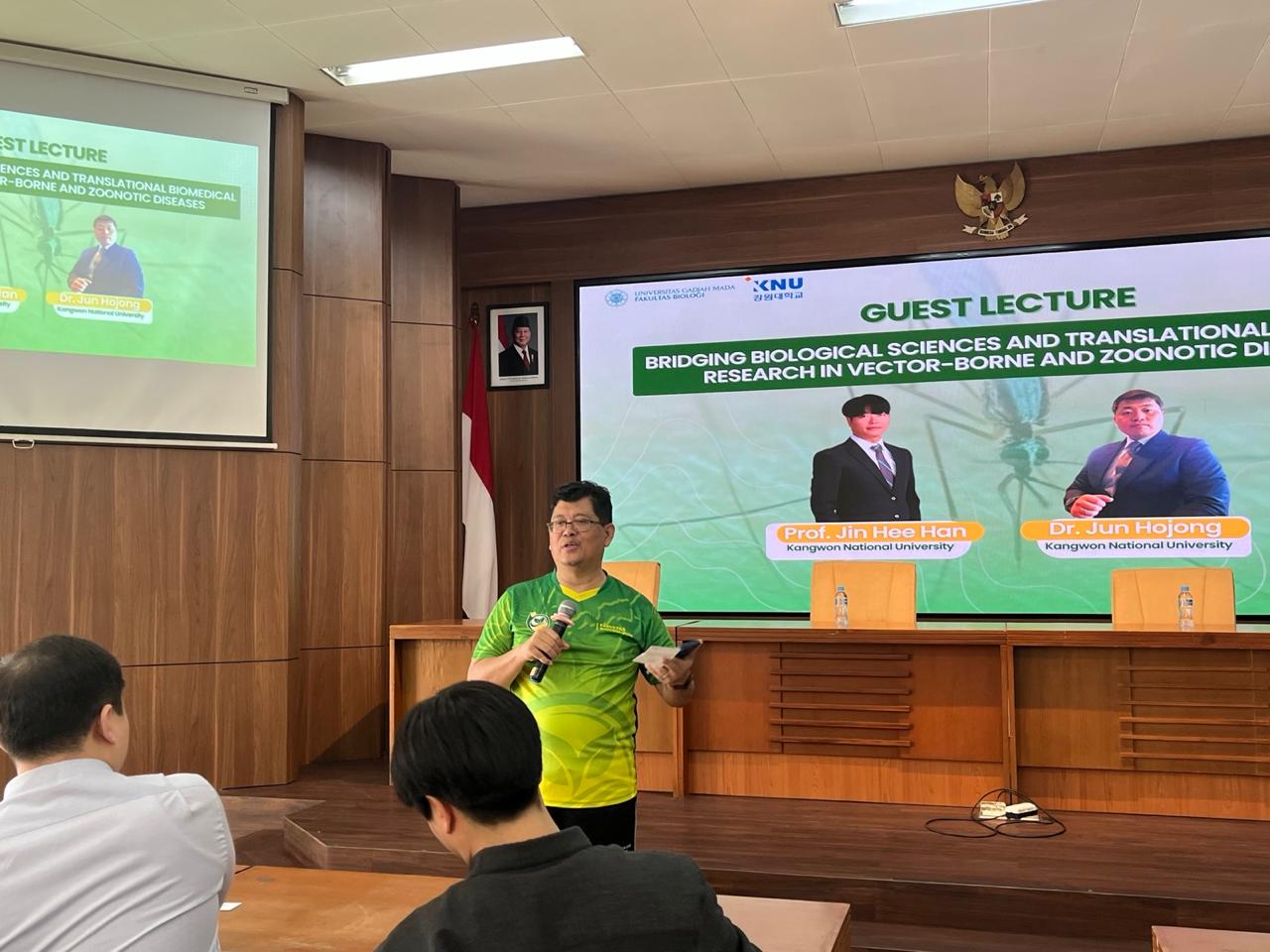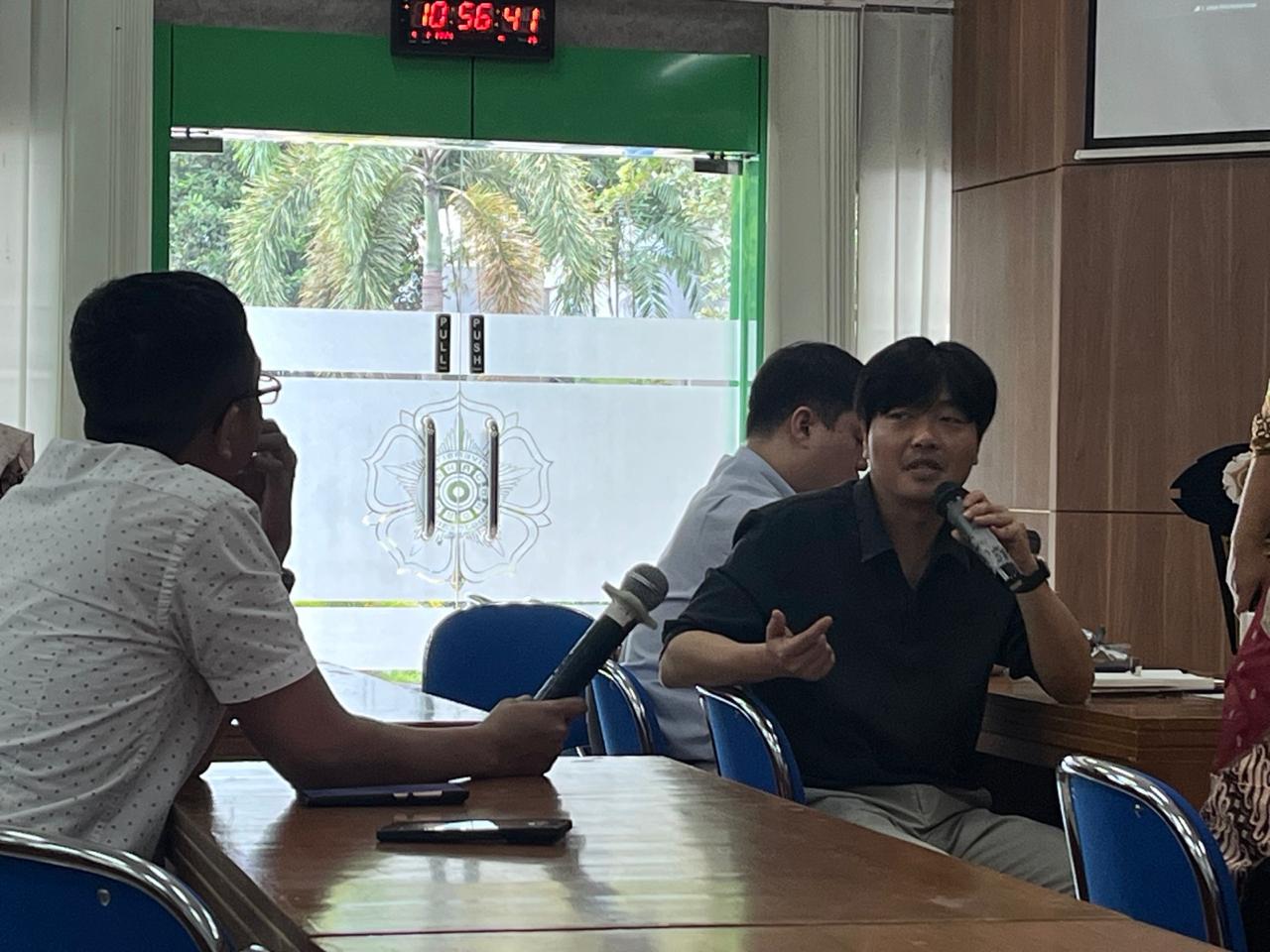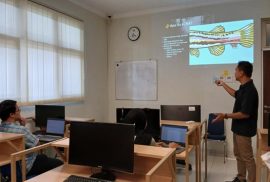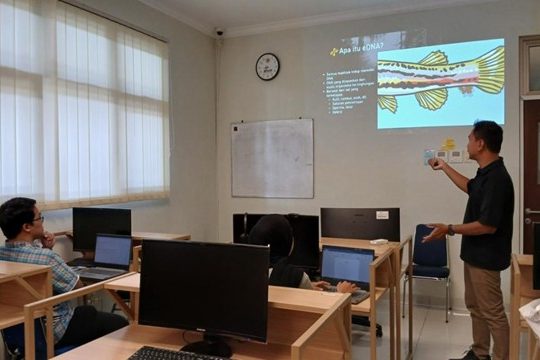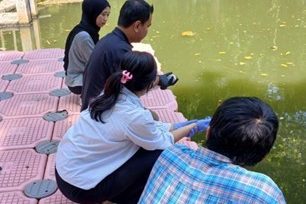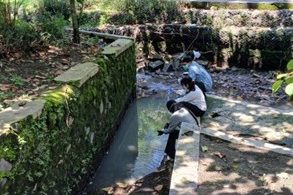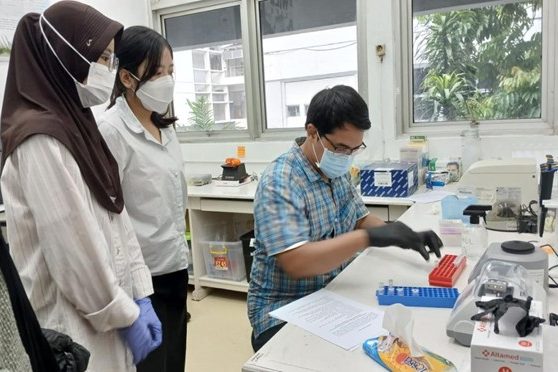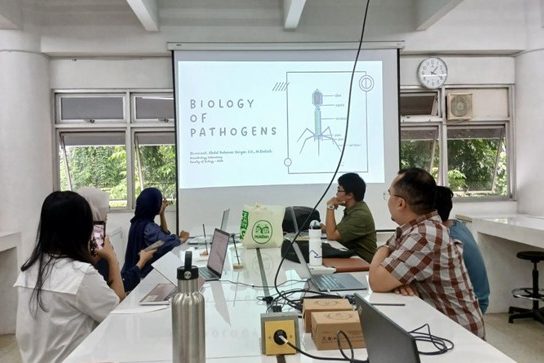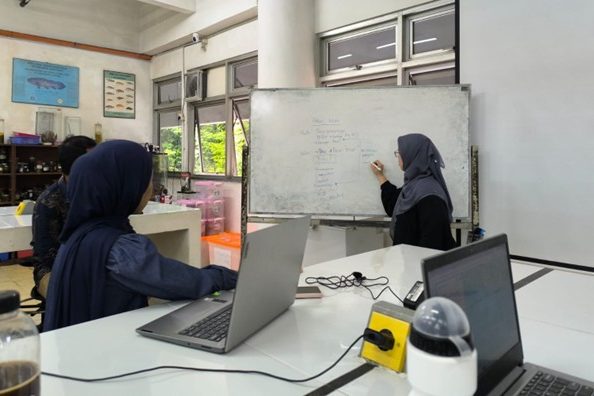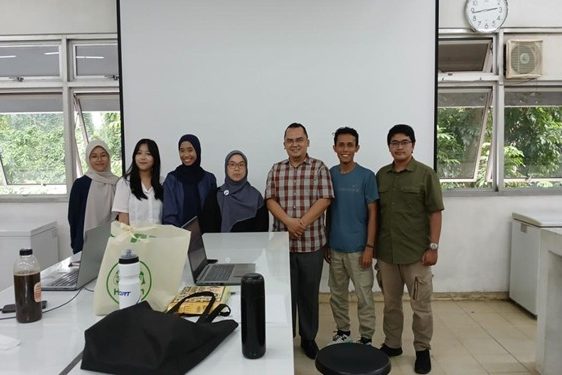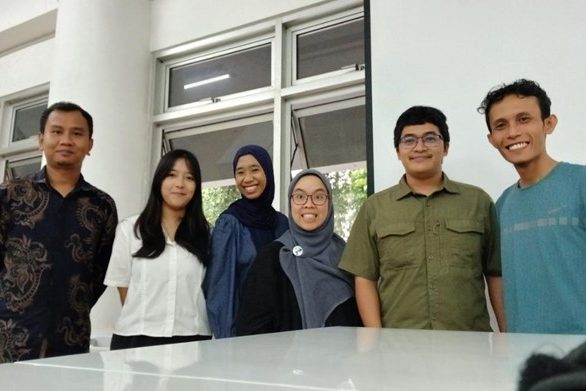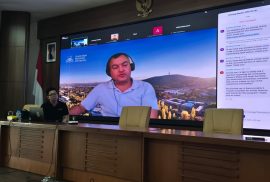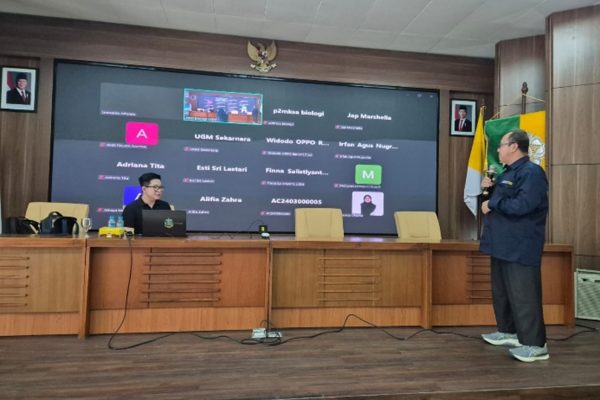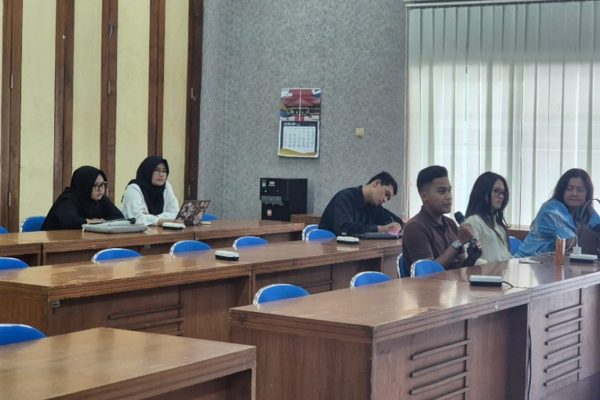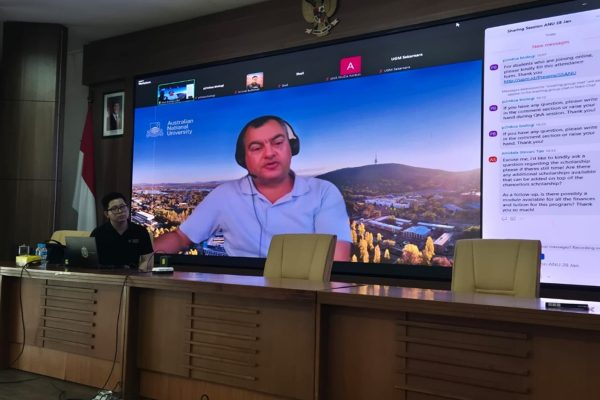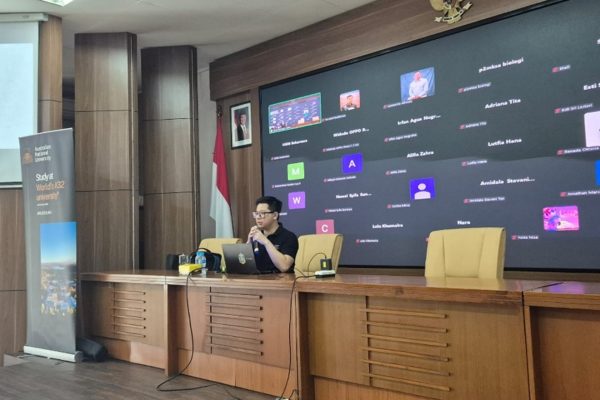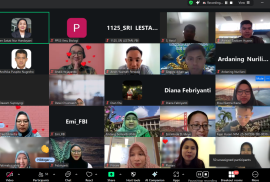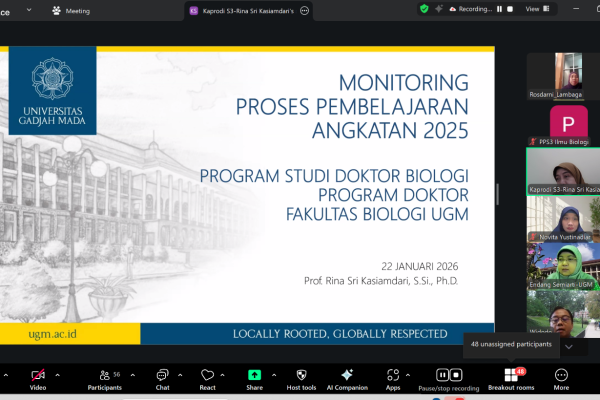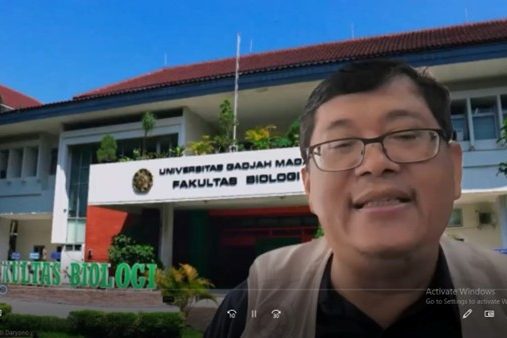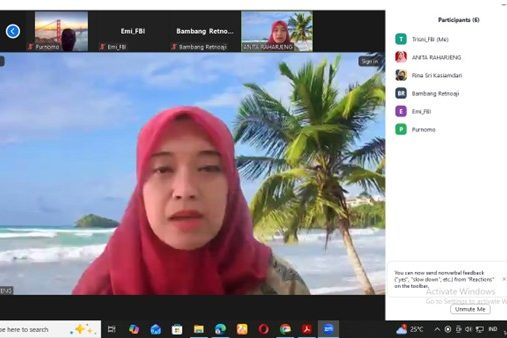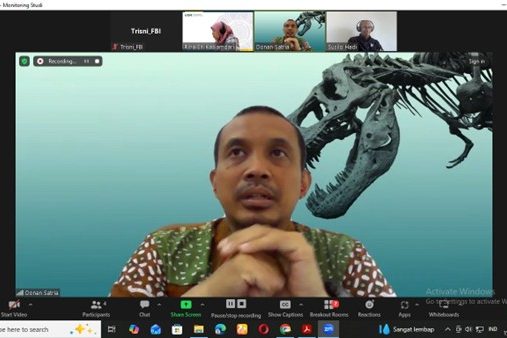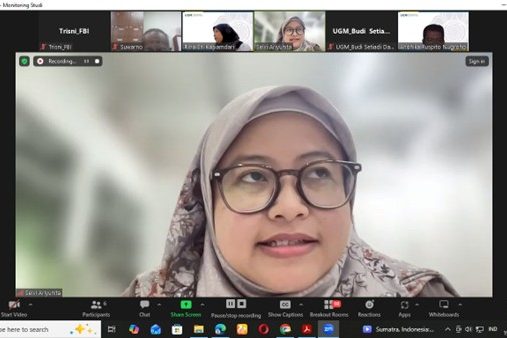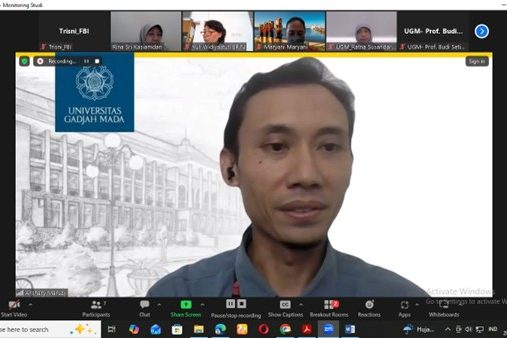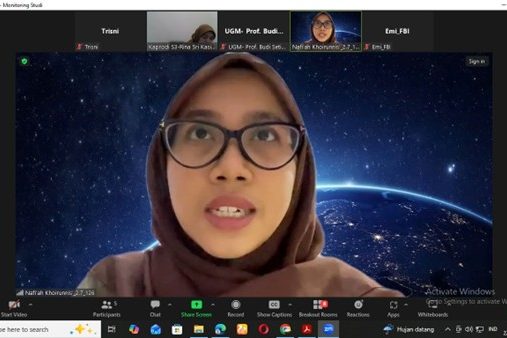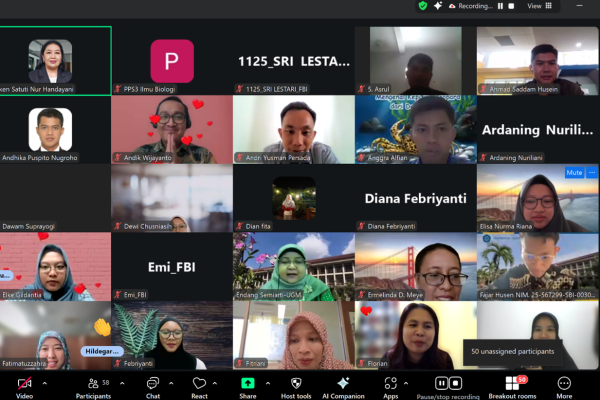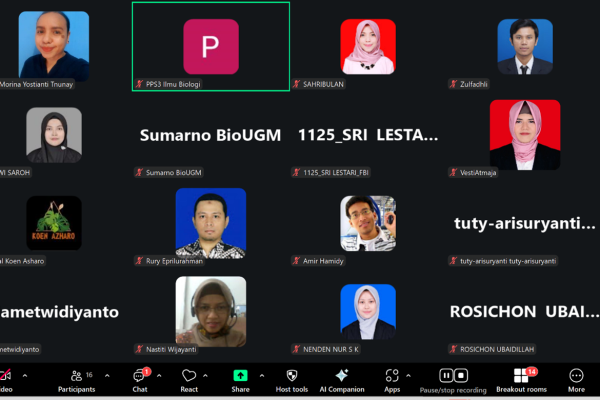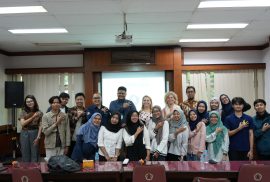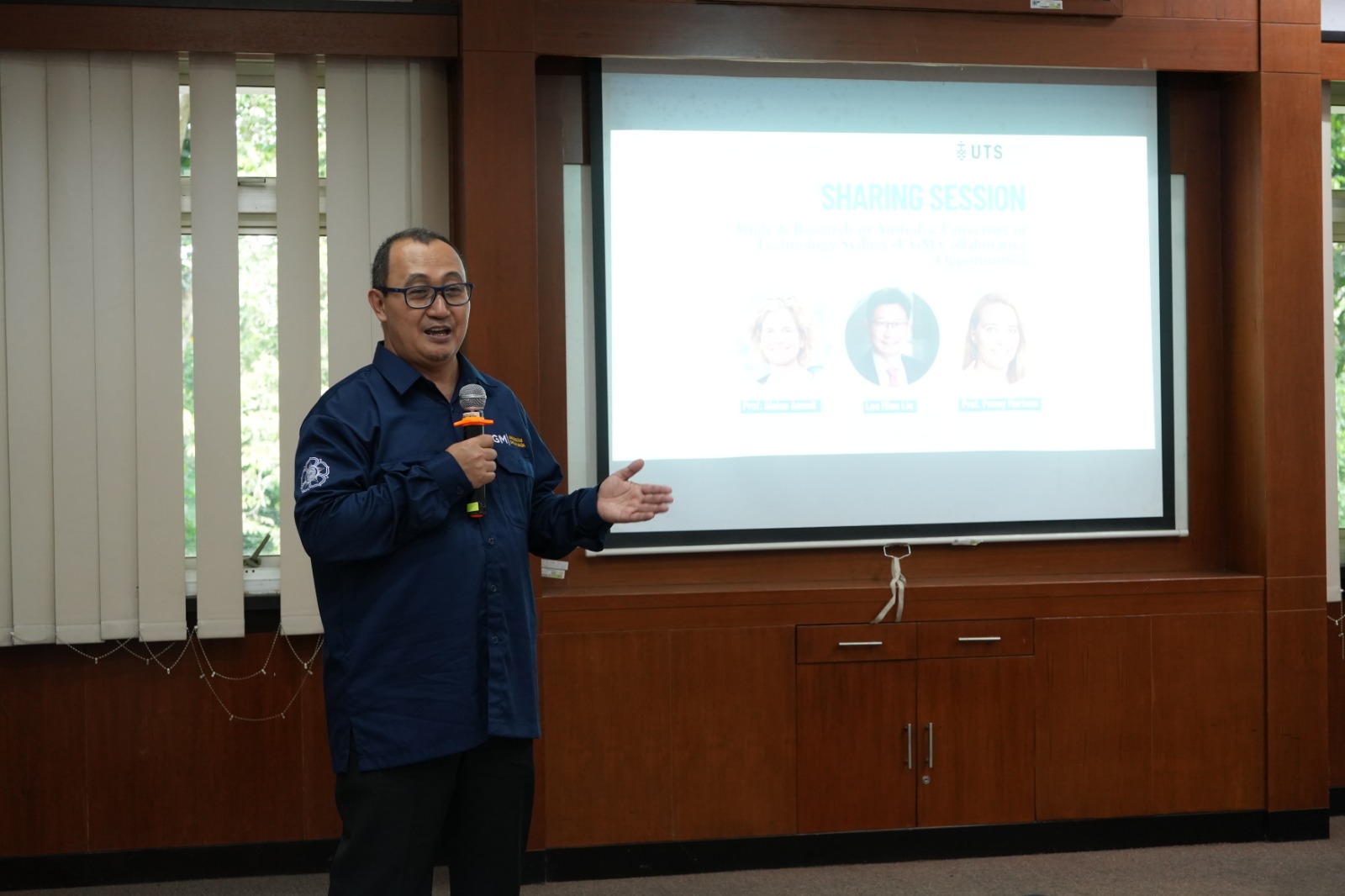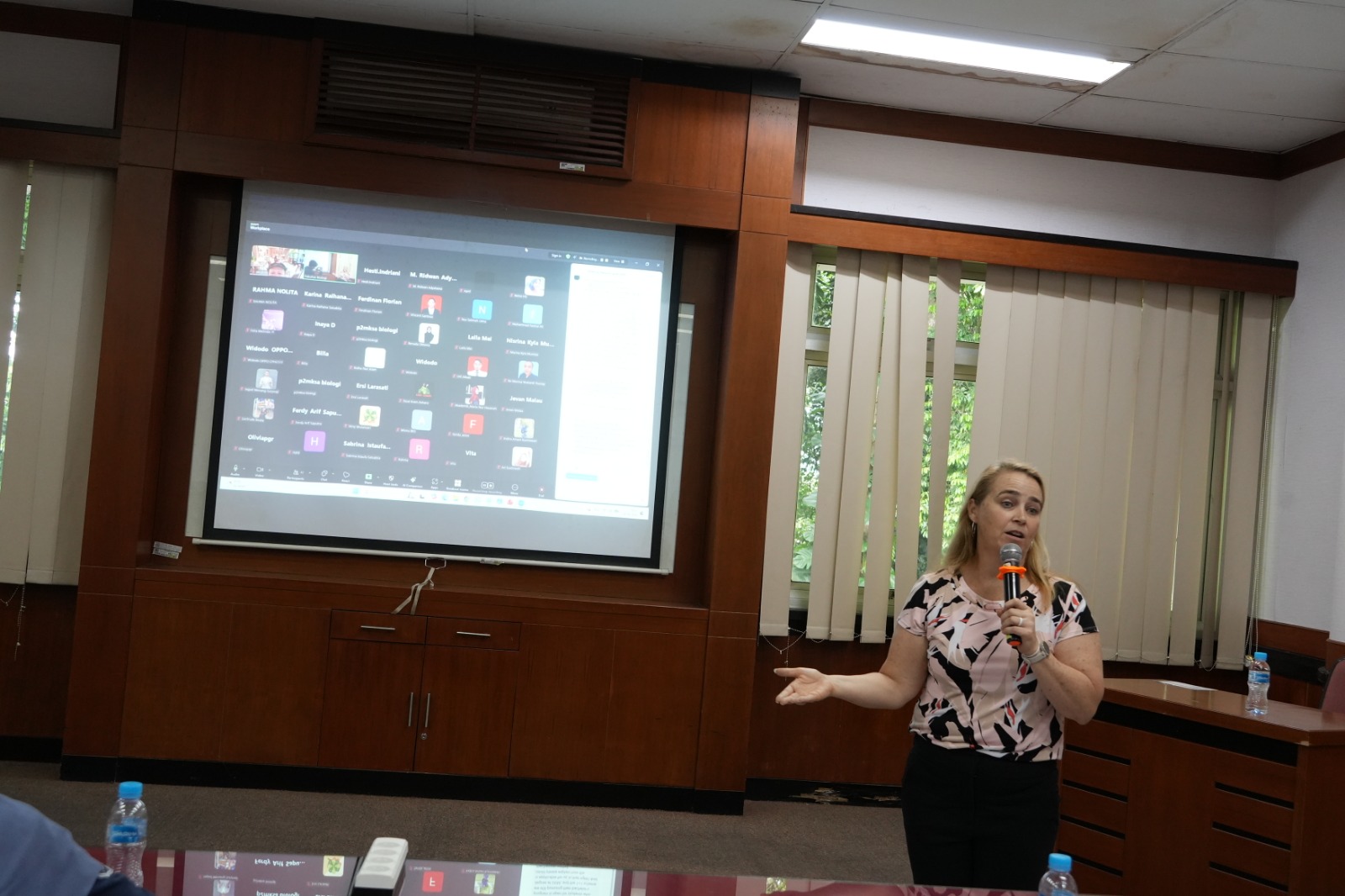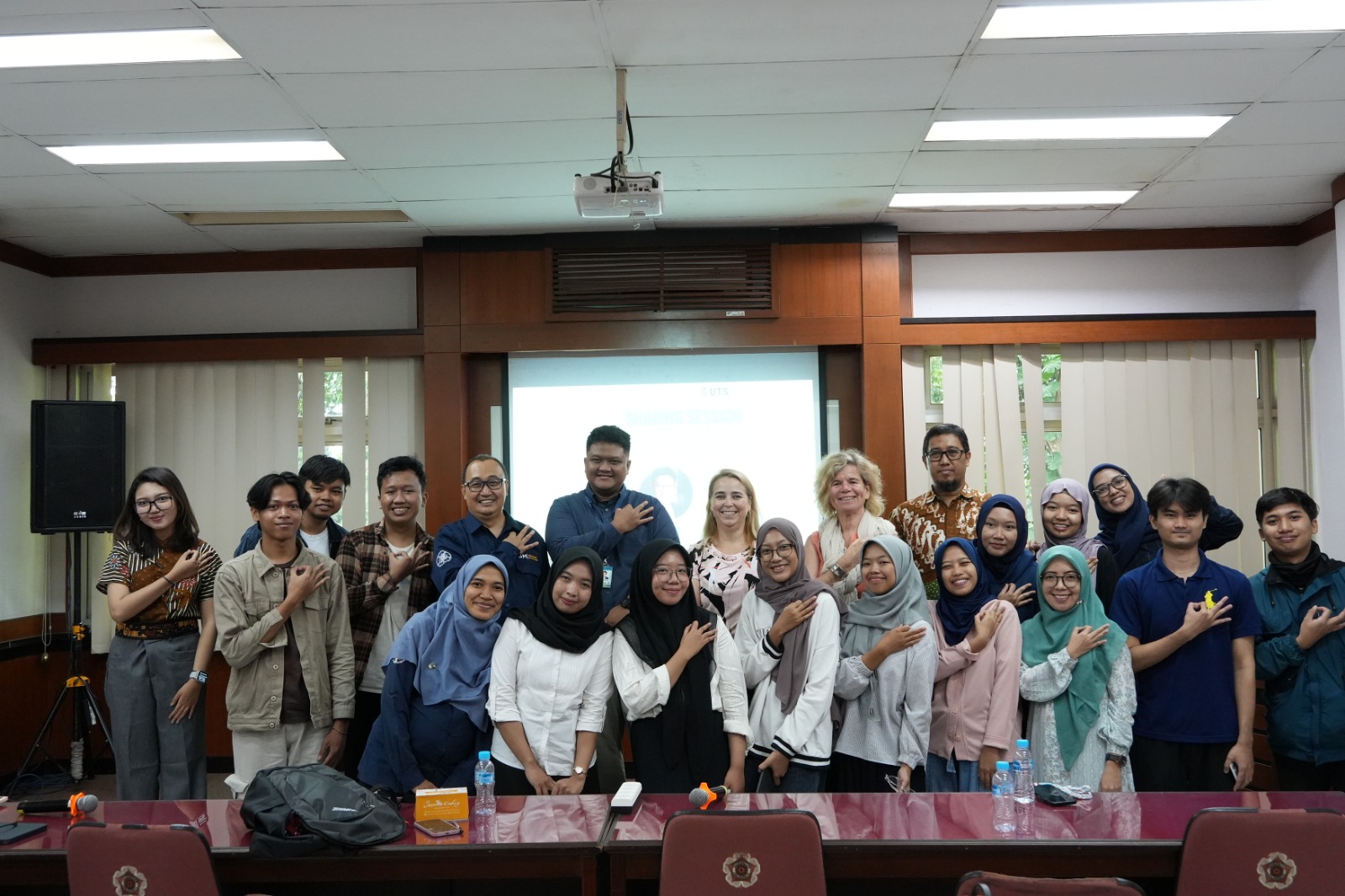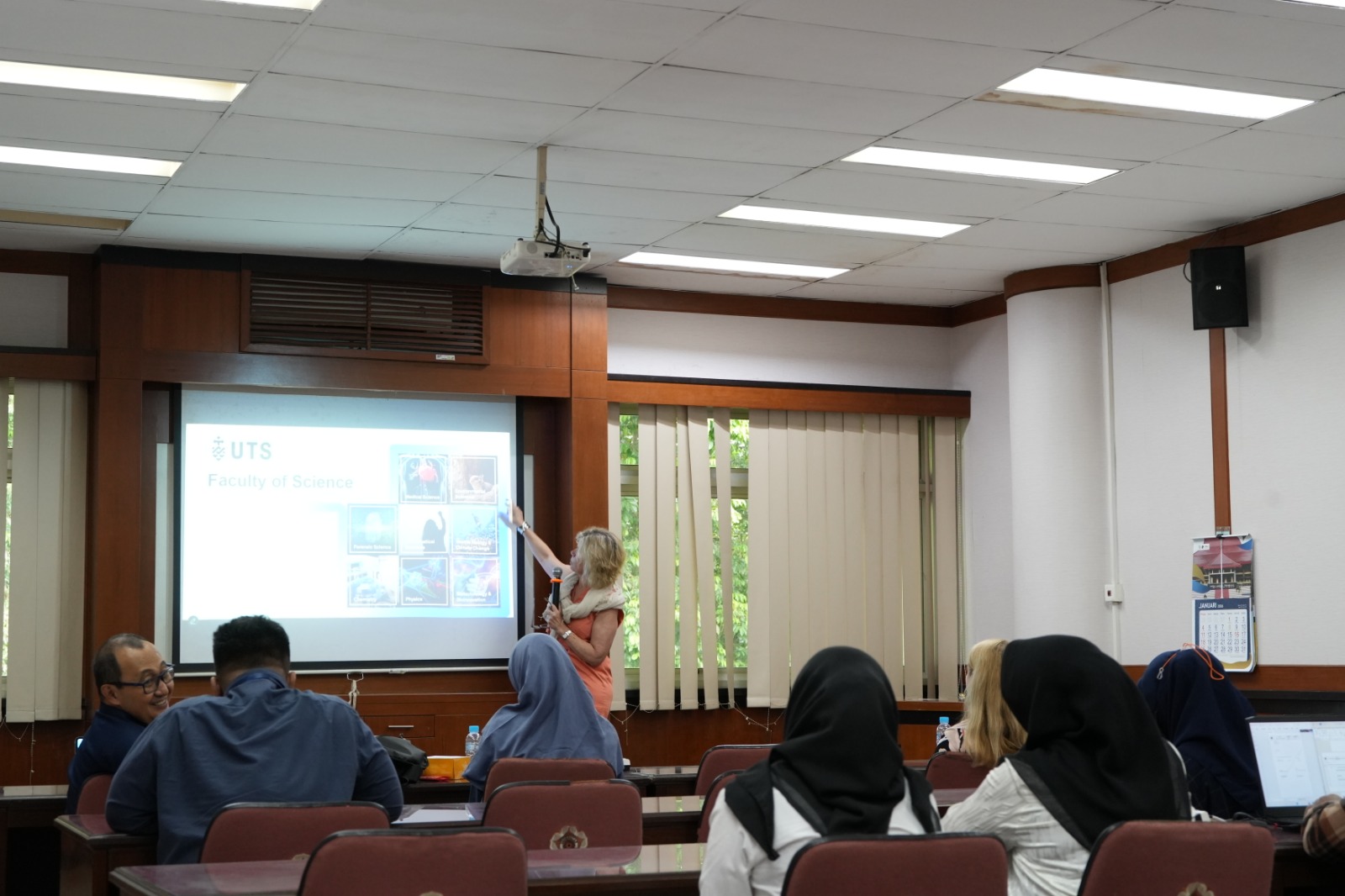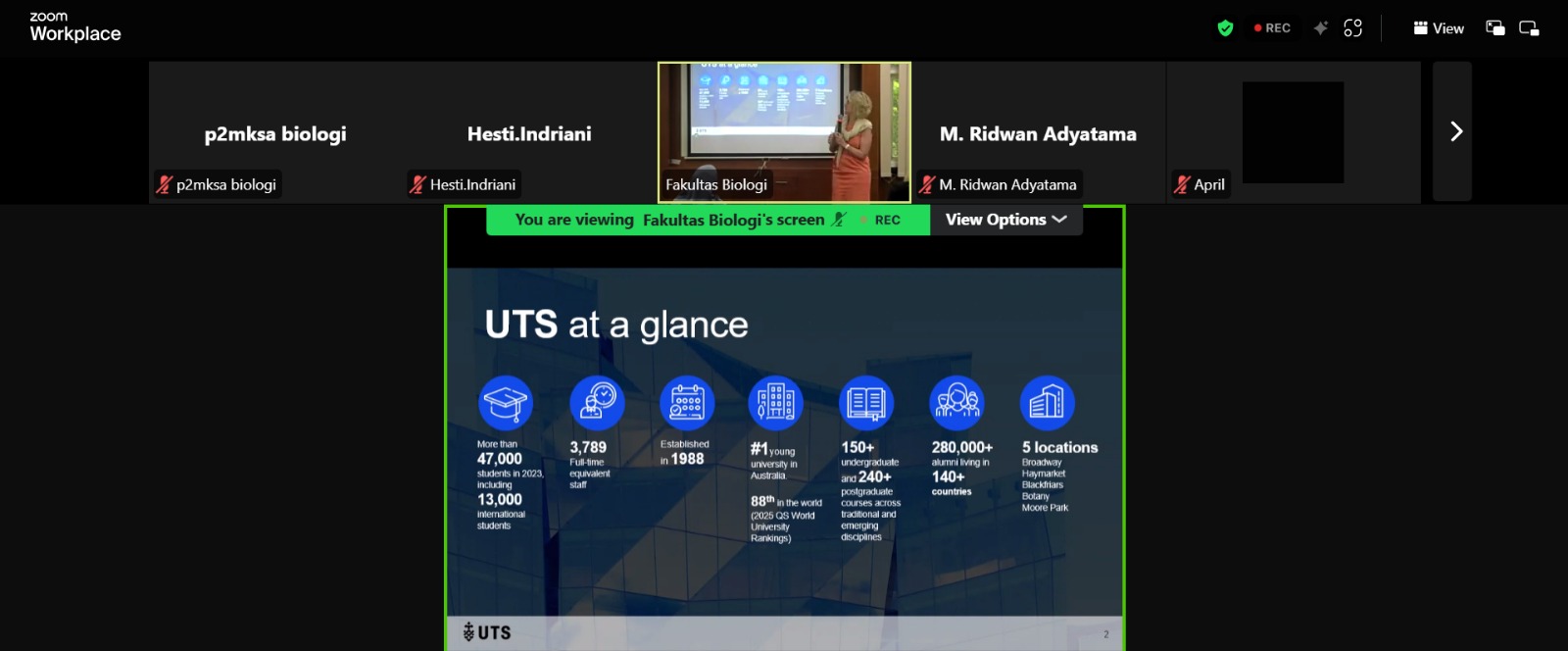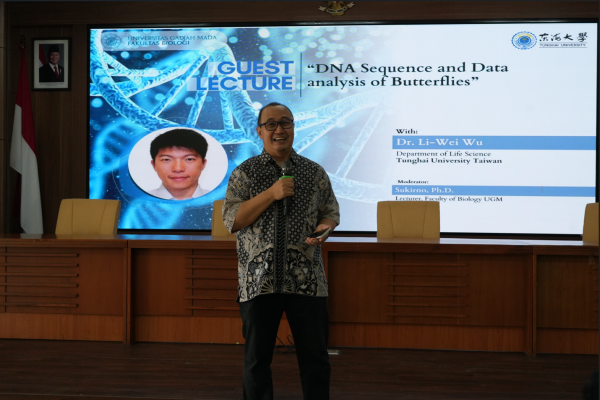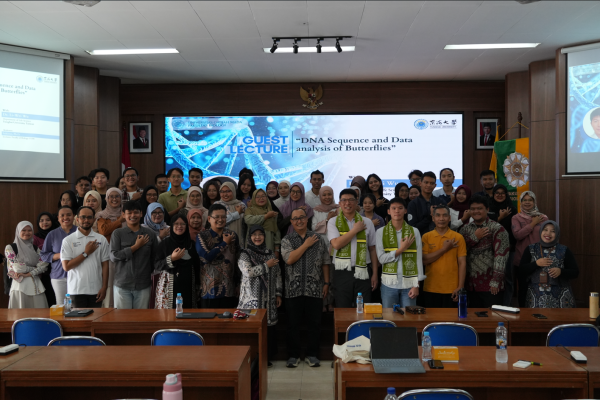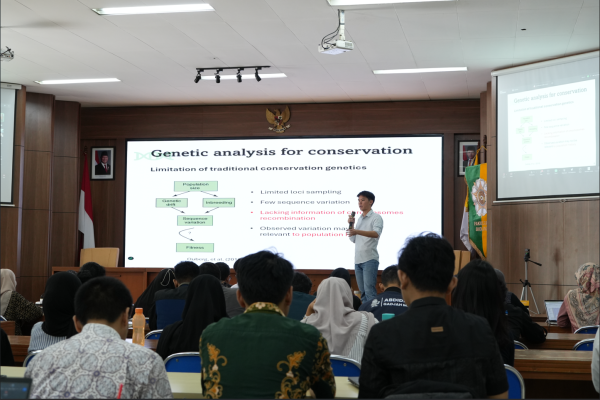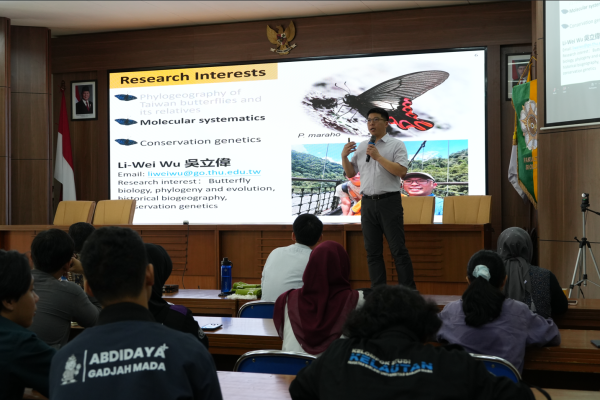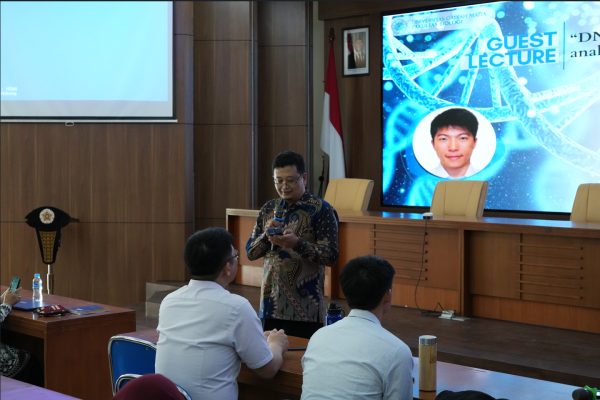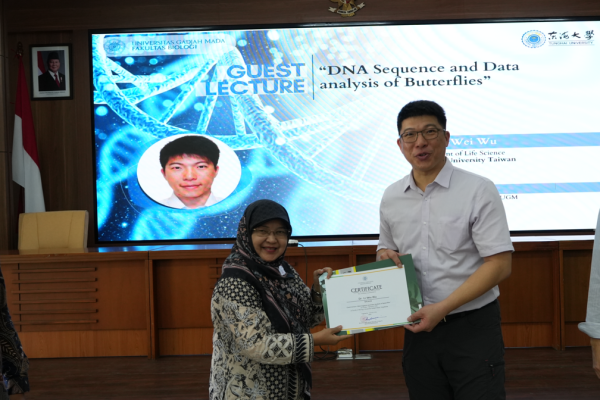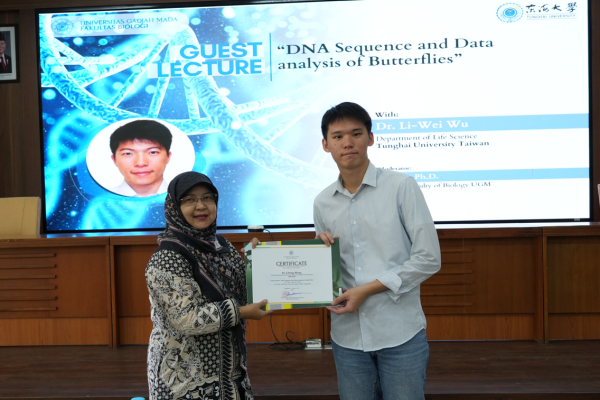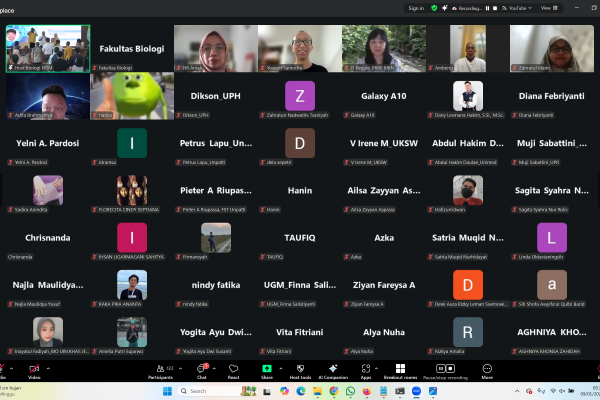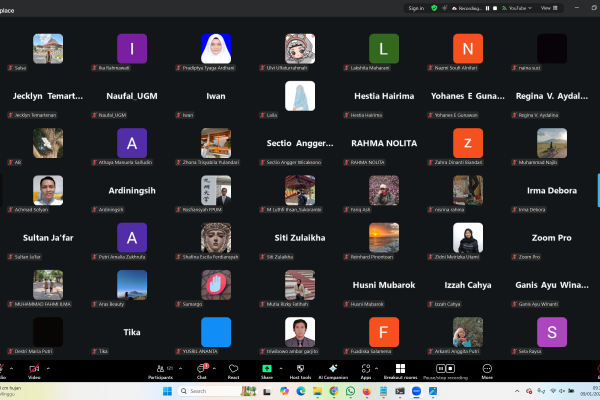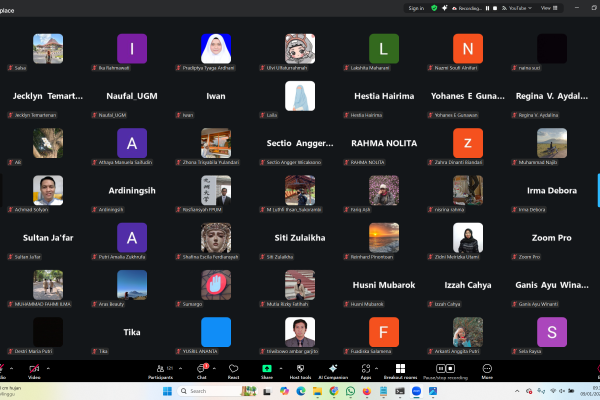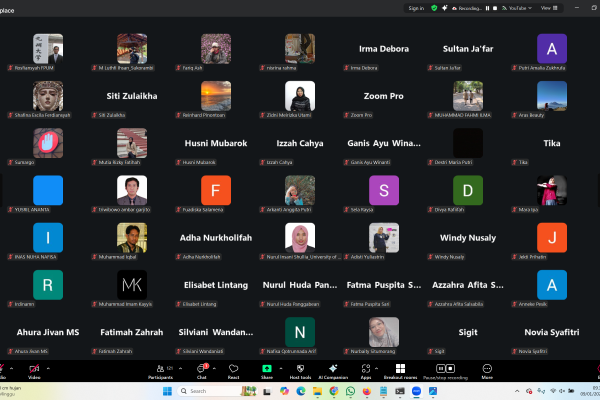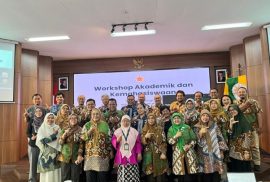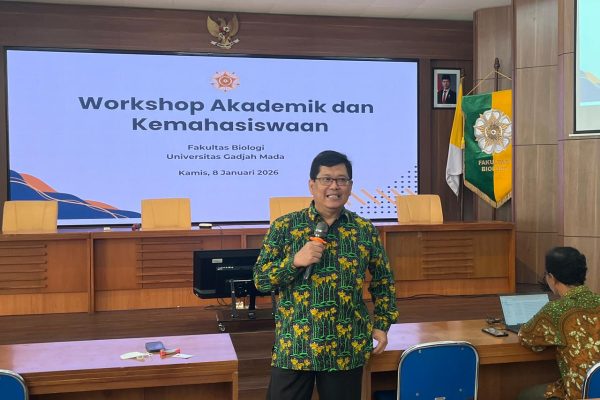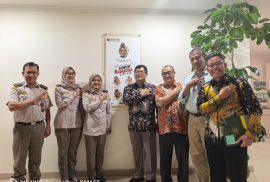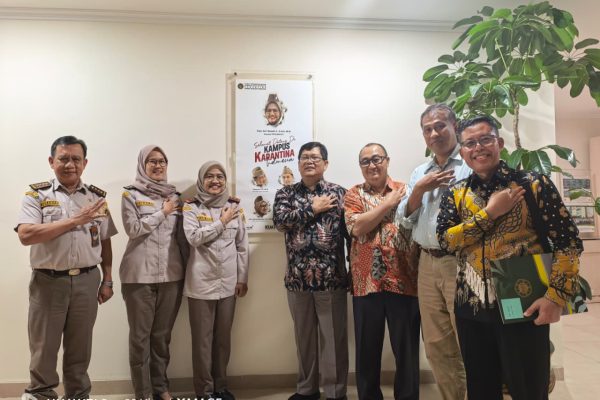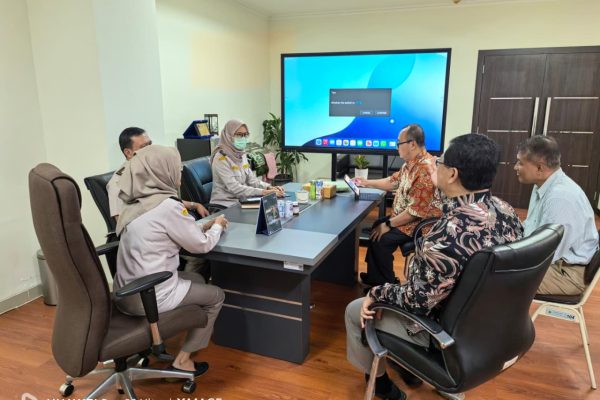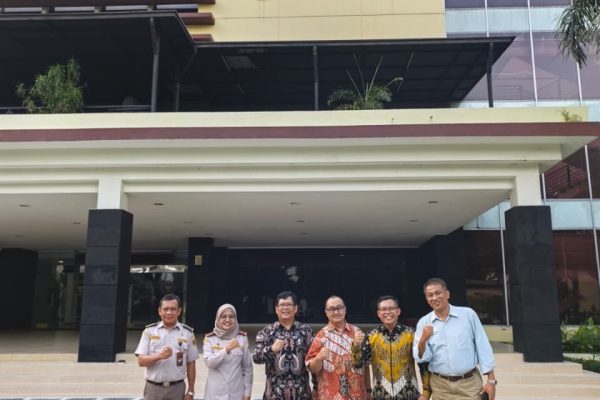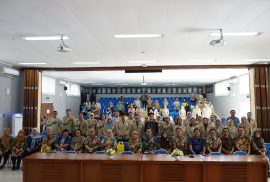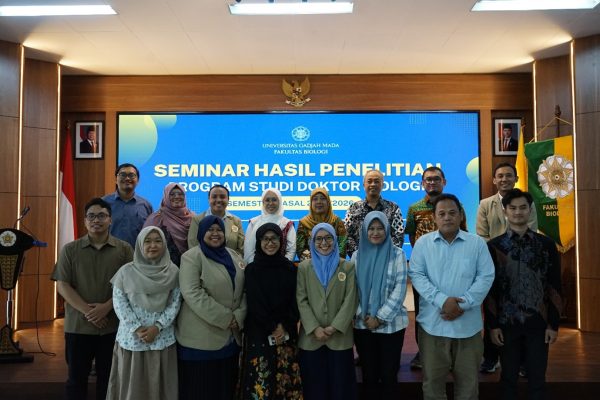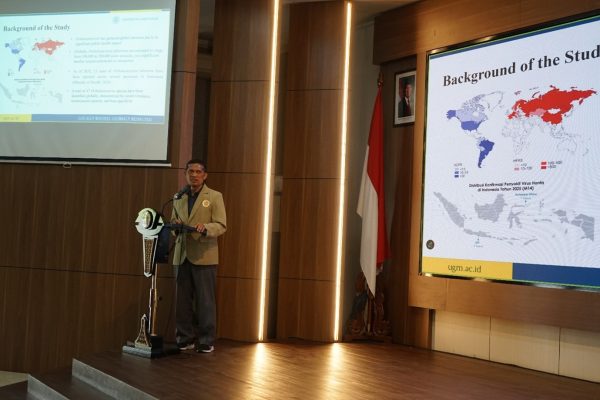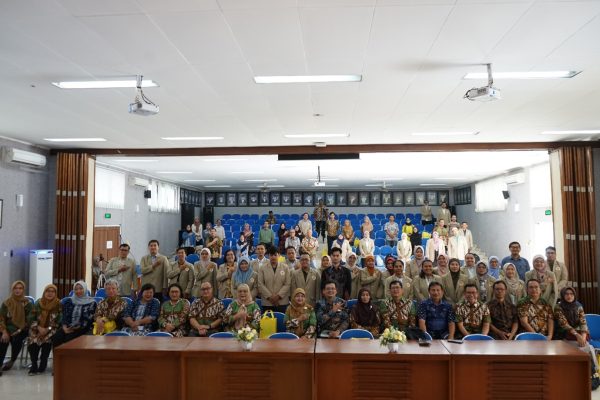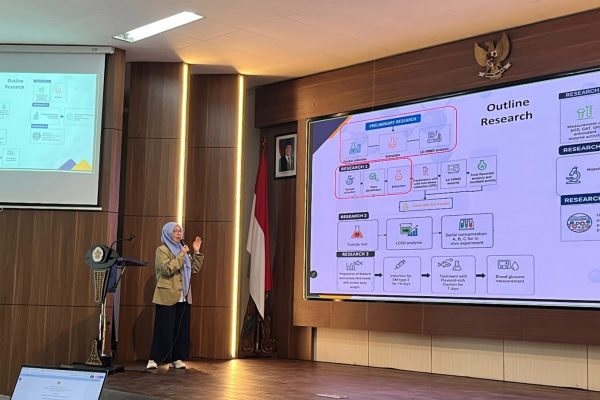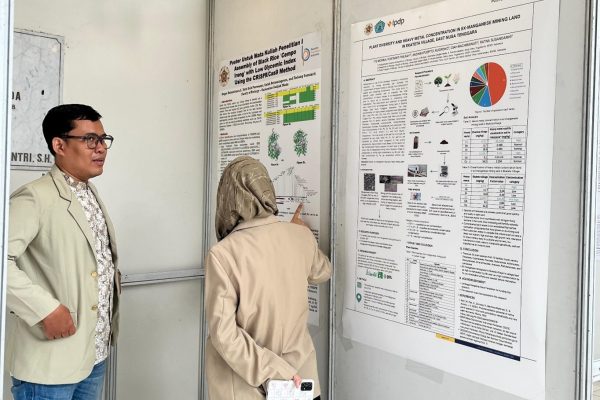Arsip:
SDG 4 : Provide Quality Education
Cairo, 12 February 2026 — The Faculty of Biology, Universitas Gadjah Mada (UGM), conducted an official cooperation visit to Egypt, with key agendas at Badr University in Cairo (BUC) and Cairo University. The delegation was led by Prof. Dr. Budi Setiadi Daryono, M.Agr.Sc., Dean of the Faculty of Biology UGM, accompanied by Dr.rer.nat. Abdul Rahman Siregar, M.Biotech, Head of the Microbiology Laboratory, Faculty of Biology UGM.
At Badr University in Cairo, the delegation was formally welcomed by the President of BUC, Prof. Dr. Ashraf Mohamed El-Shihy, and the Dean of the Faculty of Veterinary, Food Nutrition and Biotechnology, Prof. Adel Abd El-Khaleq. The meeting focused on initiating several strategic academic programs, including the development of an International Summer Course, a Double Degree program, and the organization of an International Conference. The visit also marked the signing of a Memorandum of Understanding (MoU) and a Memorandum of Agreement (MoA) between the Faculty of Biology UGM and Badr University in Cairo, signifying a shared commitment to strengthening academic and research collaboration between the two institutions.
Meanwhile, the visit to Cairo University served as a continuation of the existing partnership. The UGM delegation was welcomed by Prof. Said El-Salamouny and Dr. Ibrahim. Discussions centered on the implementation of the International Summer Course on Tropical Biodiversity and Sustainable Development to be hosted by the Faculty of Biology UGM. Both institutions also explored opportunities for sending Cairo University students to pursue Master’s (M.Sc.) and Doctoral (Ph.D.) studies at the Faculty of Biology UGM. In addition, the collaboration will be strengthened through joint supervision, joint research, and joint publications.
Through this visit, the Faculty of Biology UGM reaffirmed its commitment to expanding global academic networks and fostering sustainable international collaboration in the fields of biology, tropical biodiversity, biotechnology, and sustainable development. The partnership is expected to enhance student and faculty mobility, promote high-impact collaborative research, and contribute to the achievement of the Sustainable Development Goals (SDGs), particularly SDG 4 (Quality Education), SDG 9 (Industry, Innovation, and Infrastructure), SDG 15 (Life on Land), and SDG 17 (Partnerships for the Goals).
Yogyakarta, 6 February 2026 — The Faculty of Biology, Universitas Gadjah Mada (UGM), organized an international guest lecture held in a hybrid format at the Tropical Biology Auditorium, Faculty of Biology UGM, and broadcast online via Zoom Meeting. The event was attended by lecturers and students of the Faculty of Biology UGM, BRIN colleagues as well as participants from various universities across Indonesia.
The guest lecture featured two distinguished speakers from Kangwon National University, South Korea: Prof. Jin Hee Han and Dr. Jun Hojong. The event commenced with opening remarks by the Dean of the Faculty of Biology UGM, Prof. Dr. Budi Setiadi Daryono, M.Agr.Sc., who expressed his appreciation for the successful organization of the event and warmly welcomed the speakers and participants. He also highlighted that this marked the first visit of Prof. Jin Hee Han and Dr. Jun Hojong to Yogyakarta and UGM, emphasizing the importance of strengthening international academic engagement.
The session was moderated by Matin Nuhamunada, Ph.D., Head of the Office of International Affairs, Faculty of Biology UGM, who is also a lecturer and researcher at the Biotechnology Laboratory. The first presentation was delivered by Prof. Jin Hee Han, titled “Mosquitoes-Based Flavivirus Monitoring in Korea,” which discussed surveillance strategies for flavivirus detection through mosquito-based monitoring systems and their implications for public health preparedness.
The second presentation was delivered by Dr. Jun Hojong under the title “Ligand Receptor Interactions Underlying Human Adaptation on Non-Laverania Malaria Parasites.” His talk explored molecular mechanisms of host–parasite interactions, providing insights into human adaptation and the evolutionary dynamics of malaria parasites beyond the Laverania subgenus.
Through this international guest lecture, the Faculty of Biology UGM reaffirmed its commitment to strengthening global academic collaboration and advancing research in infectious diseases, biotechnology, and public health. The discussion and knowledge exchange during the event contribute to the achievement of the Sustainable Development Goals (SDGs), particularly SDG 3 (Good Health and Well-being), SDG 4 (Quality Education), and SDG 17 (Partnerships for the Goals). It is hoped that this initiative will foster future collaborative research, academic exchange, and joint innovation between UGM and Kangwon National University, as well as other international partners.
Faculty of Biology Researchers Collaborate in eDNA Workshop for Pathogen Detection in Wildlife Trade
Yogyakarta, January 29-31, 2026 — Dr. Dwi Sendi Priyono and Dr. Abdul Rahman Siregar from the Faculty of Biology at Universitas Gadjah Mada (UGM) collaborated with Wildlife Conservation Society Indonesia Program (WCS-IP) and the Technical Implementation Unit (UPT) of the Directorate General of Natural Resources and Ecosystem Conservation (KSDAE), Ministry of Forestry, to conduct a Molecular Genetics eDNA Workshop for Pathogen Detection held in Yogyakarta on January 29-31, 2026. This workshop is an integral part of the Master’s Level Research Fellowship Program (RFP) supported by the NSF ESCAPE project.
As research mentors, Dr. Dwi Sendi Priyono, accompanied by undergraduate student Adelia Ardhani (Biology class of 2023), guided participants through a comprehensive series of sessions on environmental DNA (eDNA) principles, ranging from basic concept introduction to practical field applications. The first session covered the presentation of eDNA concepts and principles, followed by practical training in sample collection and water sample filtration. On the second day, participants conducted DNA extraction from environmental samples, then performed qPCR (quantitative Polymerase Chain Reaction) for target pathogen detection. Dr. Abdul Rahman Siregar provided biological context with the topic “Biology of Pathogens: Pathogens Around Us,” connecting molecular genetics theory with pathogen biology. This collaboration was supported by Dr. Ulfah Mardhiah from WCS, who presented insights on the ESCAPE project, wildlife trade and consumption issues in North Sulawesi, and their correlation with zoonotic risks.
The workshop focused on mastering molecular genetics analysis techniques applicable to pathogen detection in environmental samples. Participants also had the opportunity to observe the operation of portable pathogen detection tools developed by the University of Kentucky as part of the ESCAPE project, which enables direct disease detection in the field. Master’s-level RFP participants from IPB, UGM, and UNSRAT demonstrated high enthusiasm in mastering these eDNA techniques for integration into their research on wildlife trade and consumption issues in North Sulawesi.
This workshop activity aligns with the achievement of several Sustainable Development Goals (SDGs), particularly SDG 4 (Quality Education) through capacity building and technical skills development for young researchers in molecular genetics and conservation research methods. The workshop also supports SDG 15 (Life on Land) by focusing on efforts to protect biodiversity, halt illegal wildlife trade, and strengthen science-based conservation research. Furthermore, the One Health approach applied in assessing zoonotic risks from wildlife trade contributes to SDG 3 (Health and Well-being) by strengthening the prevention of infectious diseases that can impact humans, animals, and the environment.
Figure 1. Introduction to eDNA concepts by Dr. Dwi Sendi Priyono
Figure 2. Practical training in field sample collection (water filtration)
Figure 3. Practical training in DNA extraction and qPCR analysis
Figure 4. Introduction to pathogen concepts by Dr. Abdul Rahman Siregar
Figure 5. RFP Master’s Project ESCAPE induction material presented by Dr. Ulfah Mardhiah
Yogyakarta, 28 January 2026 — The Faculty of Biology, Universitas Gadjah Mada (UGM), held a sharing session entitled UGM–ANU Double Degree Program: Pathways to Global Academic Excellence on Tuesday, 28 January 2026. The event featured Firman Prayogo from the International Strategy & Future Students Division, The Australian National University (ANU), as the main speaker. The sharing session was conducted in a hybrid format, taking place at the Tropical Biology Auditorium, Faculty of Biology UGM, and via Zoom Meeting.
The event was officially opened by Prof. Dr. Eko Agus Suyono, M.App.Sc., Vice Dean for Research, Community Service, Cooperation, and Alumni of the Faculty of Biology UGM. In his opening remarks, he emphasized that this program provides an excellent opportunity for students to explore their potential and gain learning experiences at one of the world’s leading universities.
The session was moderated by Matin Nuhamudana, Ph.D., Head of the Office of International Affairs, Faculty of Biology UGM. At the beginning of the session, Leonardo Alfonzo, Regional Manager for International Relations and Partnerships – STEMM ANU, also joined virtually to express his support for the long-standing collaboration between UGM and ANU, particularly in academic collaboration.
In his presentation, Firman Prayogo introduced The Australian National University, covering its institutional history, academic programs, research strengths, and double degree opportunities for undergraduate programs, particularly in the field of Biology. He also explained various scholarship schemes and financial support options available to students during their studies at ANU.
Students participating both onsite and online showed strong enthusiasm by actively engaging in the session and taking part in an interactive question-and-answer discussion.
Through this sharing session, the Faculty of Biology UGM aims to enhance students’ readiness to engage in the global academic environment through the UGM–ANU double degree program, which strengthens academic capacity, international networks, and graduate competitiveness. This activity also supports the achievement of SDG 4 (Quality Education) and SDG 17 (Partnerships for the Goals) by promoting access to high-quality higher education and fostering sustainable global partnerships.
Yogyakarta, 14–22 January 2026, Over the course of a week, the Faculty of Biology at Universitas Gadjah Mada (UGM) conducted its Monitoring of Academic Progress for Doctoral Students in Biological Sciences, bringing together students from all doctoral cohorts as part of an ongoing evaluation of their academic progress.
A total of 136 doctoral students participated in the monitoring. The monitoring began on 14 January 2026 with 9 students from the 2019–2020 cohorts, followed by 10 students from the 2021 cohort on 15 January 2026. On 19 January 2026, 19 students from the 2022 cohort participated, followed by 28 students from the 2023 cohort on 20 January 2026. On Wednesday, 21 January 2026, the monitoring included 15 students from the 2024 cohort. On the final day, 22 January 2026, the sessions were attended by 15 students from the 2024 cohort and 39 students from the 2025 cohort. Monitoring for the 2025 cohort was carried out in group sessions, while students from the other cohorts participated in individual meetings with program management and their supervisory teams. In each session, students discussed the progress of their research, the challenges they had encountered, and the strategies they planned to overcome these obstacles. The sessions fostered open, meaningful dialogue, providing each student with guidance tailored to their individual needs.
The activity aimed to ensure that students’ academic progress aligns with university regulations, while also supporting timely completion of studies without compromising the quality of academic output and research. Beyond its evaluative purpose, the monitoring served as an academic dialogue to strengthen guidance and institutional support for doctoral students. During the sessions, the Dean of the Faculty of Biology, Prof. Dr. Budi Setiadi Daryono, M.Agr.Sc., emphasized that students must remain focused on prioritizing their studies, approach every stage of the academic process with full commitment and seriousness, and successfully complete their academic journey on time.
The program also reflects the Faculty of Biology UGM’s alignment with the Sustainable Development Goals (SDGs), particularly SDG 4 (Quality Education), SDG 9 (Industry, Innovation, and Infrastructure), and SDG 16 (Peace, Justice, and Strong Institutions), emphasizing responsible academic governance and excellence in research.
Yogyakarta, 21 January 2026 — The Faculty of Biology, Universitas Gadjah Mada (UGM), organized a Sharing Session on Study & Research in Australia: University of Technology Sydney–UGM Collaborative Opportunities on Wednesday (21/1). The event was conducted online and hosted at the Upper Meeting Room of the Faculty of Biology UGM, with participants consisting of lecturers and students from the Faculty of Biology as well as other faculties within UGM.
The session was officially opened by Prof. Dr. Eko Agus Suyono, M.App.Sc., Vice Dean for Research, Community Service, Collaboration, and Alumni of the Faculty of Biology UGM. In his opening remarks, he highlighted that the collaboration between UGM and the University of Technology Sydney (UTS) has been established for several years, encompassing research collaboration and academic cooperation such as international summer course funded by New Colombo Plan and double degree programs. He expressed his hope that this session would serve as a valuable opportunity for students to explore international academic and research pathways.
The main session was moderated by Matin Nuhamunada, Ph.D., a lecturer at the Faculty of Biology UGM. The sharing session featured two distinguished speakers from the University of Technology Sydney: Prof. Alaina Ammit, Associate Dean (Research), Faculty of Science, UTS, and Prof. Penny Martens, Pro Vice-Chancellor (Higher Degrees by Research), UTS.
In her presentation, Prof. Alaina Ammit introduced the University of Technology Sydney and its research facilities, with particular emphasis on the Faculty of Science. This was followed by a presentation from Prof. Penny Martens, who outlined academic programs, research collaboration opportunities, and scholarship schemes, including funding opportunities through the Indonesia Endowment Fund for Education (LPDP). Both speakers also introduced the expertise of UTS lecturers and researchers, highlighting potential areas for collaboration with UGM students and academics.
Through this sharing session, it is expected that the collaboration between UGM and UTS will be further strengthened, not only in the fields of education and research but also in the development of globally competitive human resources. This initiative supports the achievement of the Sustainable Development Goals (SDGs), particularly SDG 4 (Quality Education) by expanding access to high-quality international education, SDG 9 (Industry, Innovation, and Infrastructure) through strengthened research and innovation, and SDG 17 (Partnerships for the Goals) by fostering sustainable global partnerships.
Yogyakarta, January 9, 2026 — The Faculty of Biology, Universitas Gadjah Mada (UGM), held an international guest lecture on Friday, January 9, 2026. The event was conducted in a hybrid format, taking place at the Tropical Biology Auditorium, Faculty of Biology UGM, and streamed online via Zoom Meeting. The lecture was attended by more than 200 participants, comprising lecturers and students from the Faculty of Biology UGM as well as participants from various universities across Indonesia.
The guest lecture featured two speakers from the Department of Life Science, Tunghai University, Taiwan, namely Dr. Li-Wei Wu and Dr. Bo-Cheng Wang, both of whom are active researchers in the fields of biodiversity and conservation genetics. The event commenced with an opening remark by Dr. Eko Agus Suyono, M.App.Sc., Vice Dean for Research, Community Service, Collaboration, and Alumni Affairs of the Faculty of Biology UGM. In his speech, he expressed his appreciation for the successful organization of the event and warmly welcomed the speakers and participants. He also highlighted that the Faculty of Biology UGM is home to many experts in entomology and genetics, and expressed hope that this guest lecture would serve as a starting point for future research and academic collaborations.
The session was moderated by Sukirno, Ph.D., Chair of the Undergraduate Study Program at the Faculty of Biology UGM, who is also a lecturer and researcher at the Entomology Laboratory. The first presentation was delivered by Dr. Li-Wei Wu, entitled “Applying DNA Sequence and Data Analysis of Butterflies to Biodiversity and Evolutionary Researches.” His presentation focused on the phylogeography of Taiwanese butterflies and their relatives, molecular systematics, and conservation genetics, providing a comprehensive overview of the use of molecular data in evolutionary and biodiversity studies.
The second presentation was delivered by Dr. Bo-Cheng Wang, entitled “Is an Endangered Species Truly at Risk?” In his talk, Dr. Wang discussed the results of whole-genome resequencing research on the broad-tailed swallowtail butterfly (Papilio maraho), aimed at assessing the species’ extinction risk more accurately using genomic-based data.
Throughout the lecture and discussion sessions, participants demonstrated strong enthusiasm, as reflected in the lively questions and interactive discussions. Through this activity, the Faculty of Biology UGM hopes to strengthen international networks, open opportunities for research collaboration, academic exchange, and capacity building in the fields of biodiversity and conservation genetics. This initiative also supports the achievement of the Sustainable Development Goals (SDGs), particularly SDG 4 (Quality Education) through the enhancement of quality education based on global collaboration, SDG 15 (Life on Land) through biodiversity conservation efforts, and SDG 17 (Partnerships for the Goals) by strengthening international partnerships in education and research.
Yogyakarta, 8 January 2026 — The Faculty of Biology, Universitas Gadjah Mada (UGM), held the Academic and Student Affairs Workshop 2026 at the Tropical Biology Auditorium, KPTU Building, 1st Floor. The workshop was attended by all academic staff of the Faculty of Biology UGM as part of continuous efforts to strengthen the quality of higher education in alignment with the Sustainable Development Goals (SDGs).
The workshop was officially opened by the Dean of the Faculty of Biology UGM, Prof. Dr. Budi Setiadi Daryono, M.Agr.Sc., who emphasized the importance of academic synergy in curriculum renewal, quality assurance, and the development of adaptive, inclusive, and sustainable learning systems. These efforts reflect the Faculty’s commitment to SDG 4 (Quality Education) through the provision of high-quality and relevant higher education.
In the main session, the Vice Dean for Academic and Student Affairs, Prof. Dr. Bambang Retnoaji, S.Si., M.Sc., presented the 2025 Academic and Student Affairs Key Performance Targets, focusing on the enhancement of learning outcomes, the strengthening of programme recognition, and the expansion of access to higher education. These initiatives contribute to SDG 4 and support innovation in academic governance in line with SDG 9 (Industry, Innovation, and Infrastructure).
The workshop also featured a refreshing session on the Outcome-Based Assessment Information System (SIOBA) delivered by Zuliyati Rohmah, S.Si., M.Si., Ph.D.Eng., aimed at reinforcing the implementation of Outcome-Based Education (OBE). The OBE approach supports accountability, transparency, and continuous quality improvement in higher education, further advancing the Faculty’s contribution to SDG 4.
Subsequently, the workshop focused on monitoring, evaluation, and preparation for the upcoming semester across all academic levels. The undergraduate programme was presented by Sukirno, S.Si., M.Sc., Ph.D., followed by the master’s programme by Prof. Dr. Diah Rachmawati, S.Si., M.Sc., the professional programme by Prof. Dra. Tuty Arisuryanti, M.Sc., Ph.D., and the doctoral programme by Prof. Rina Sri Kasiamdari, S.Si., Ph.D. This cross-level academic discussion reflects strengthened internal collaboration and supports SDG 17 (Partnerships for the Goals).
Through this workshop, the Faculty of Biology UGM reaffirms its commitment to continuous academic improvement and to making meaningful contributions to the achievement of SDG 4 (Quality Education), SDG 9 (Industry, Innovation, and Infrastructure), and SDG 17 (Partnerships for the Goals) at both national and global levels.
Yogyakarta, 6 January 2026 — The Faculty of Biology, Universitas Gadjah Mada (UGM), conducted an official visit to the Indonesian Quarantine Agency (Badan Karantina Indonesia) as part of efforts to strengthen institutional synergy in supporting the protection of national biodiversity. The visit served as a strategic forum to discuss the alignment of the Faculty of Biology UGM’s academic programs with the duties and functions of the Indonesian Quarantine Agency.
The UGM delegation was led by Prof. Dr. Budi Setiadi Daryono, Dean of the Faculty of Biology, accompanied by Dr. Eko Agus Suyono, M.App.Sc., Vice Dean for Research, Community Service, Cooperation, and Alumni, and Dr. Slamet Widiyanto, M.Sc., Vice Dean for Finance, Assets, and Human Resources of the Faculty of Biology UGM.
The visit was received by Dian Seri Rezeki Kusumastuti, S.Hut., M.Si., Head of the Center for Human Resource Development for Animal, Fish, and Plant Quarantine; Yokanan, S.Pi., M.Si., Deputy for Fish Quarantine; as well as drh. Esmiralda Eka Fitri, M.Si., Functional Officer of Veterinary Quarantine at the Indonesian Quarantine Agency.
During the meeting, discussions focused on several flagship academic programs of the Faculty of Biology UGM that are highly relevant to the mandate and operational needs of the Indonesian Quarantine Agency, particularly the Professional Program for Biodiversity Curators (PKKH), as well as the Master’s and Doctoral Programs. These programs were recognized for their strong potential in supporting human resource capacity building and strengthening the scientific foundation of quarantine activities.
The meeting also highlighted opportunities for collaboration in genomic analysis through the Integrated Genome Factory (IGF) facility at the Faculty of Biology UGM. The utilization of IGF is expected to support quarantine operations, particularly in organism identification, early detection of invasive species, and science- and technology-based protection of national biodiversity.
Through this exploratory collaboration, the Faculty of Biology UGM and the Indonesian Quarantine Agency reaffirm their commitment to strengthening sustainable partnerships. This initiative aligns with the achievement of the Sustainable Development Goals (SDGs), particularly SDG 4 (Quality Education), SDG 9 (Industry, Innovation, and Infrastructure), SDG 15 (Life on Land), and SDG 17 (Partnerships for the Goals).
The Faculty of Biology, Universitas Gadjah Mada (UGM) held its Doctoral Research Progress Seminar on 18 December 2025 at the Faculty of Biology, UGM. This seminar is a mandatory academic activity as part of the Dissertation Research Courses in the doctoral curriculum.
The event commenced with a report delivered by the Head of the Doctoral Program in Biological Sciences, Prof. Rina Sri Kasiamdari, Ph.D., followed by a welcoming address and official opening by the Dean of the Faculty of Biology, Prof. Dr. Budi Setiadi Daryono, M.Agr.Sc. In his remarks, the Dean highlighted the Faculty’s ongoing commitment to academic excellence and to advancing biological research that addresses global challenges in line with the United Nations Sustainable Development Goals (SDGs).
During the seminar, doctoral candidates presented updates on their research progress, discussed challenges encountered, and outlined their plans for the next phases of their studies. The seminar provided an essential platform for structured academic reflection, peer engagement, and systematic evaluation of doctoral research trajectories, ensuring that students remain on track toward timely completion of their degrees. In addition to oral presentations, students showcased their research through posters, allowing fellow students and participants to engage with and learn from each other’s work. This format provided an accessible platform to highlight individual achievements and promote knowledge exchange within the academic community.
The research topics presented showcased the Faculty’s contributions to multiple SDGs, including SDG 3 (Good Health and Well-being), SDG 4 (Quality Education), SDG 13 (Climate Action), SDG 14 (Life Below Water), and SDG 15 (Life on Land). These contributions were exemplified through studies spanning health-related biology, biodiversity, ecology, and conservation biology.
Each presentation was assessed by the Promotor Team, who provided constructive feedback and academic evaluation. Assessments emphasized the alignment of research objectives with outcomes, the rigor of scientific analysis, identification of research challenges, and clarity of future research directions, particularly in relation to sustainability goals.
Through seminars such as this, the Faculty of Biology, UGM, continues to foster a rigorous and supportive doctoral research environment, ensuring that scholarly work remains both scientifically robust and globally relevant.

